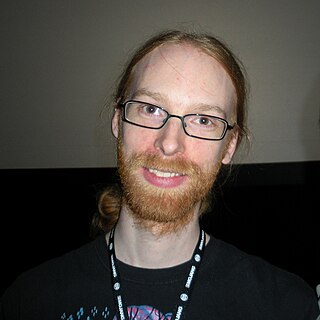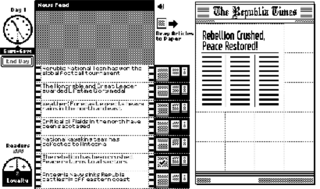Uniloc Corporation is a company founded in Australia in 1992.

Minecraft is a 2011 sandbox game developed by Mojang Studios and originally released in 2009. The game was created by Markus "Notch" Persson in the Java programming language. Following several early private testing versions, it was first made public in May 2009 before being fully released on November 18, 2011, with Notch stepping down and Jens "Jeb" Bergensten taking over development. Minecraft has become the best-selling video game in history, with over 300 million copies sold and nearly 140 million monthly active players as of 2023. It has been ported to several platforms.

Markus Alexej Persson, also known as "Notch", is a Swedish video game programmer and designer. He is best known for creating the sandbox video game Minecraft, which has since become the best-selling video game in history; and for founding the video game development company Mojang Studios in 2009.

Mojang Studios is a Swedish video game developer based in Stockholm. The studio is best known for developing the sandbox and survival game Minecraft, the best-selling video game of all time.
Ludum Dare is a game jam competition. It was founded by Geoff Howland and was first held in April 2002. It is currently run by Mike Kasprzak, who has been part of the team since the beginning. Participants are required to create a video game that fits within a given theme in two or three days. Participants often release a time-lapse video of the development of their game.

Jens Peder Bergensten, also known as Jeb or Jeb_, is a Swedish video game programmer and designer. He is best known as the lead designer of Minecraft, and is the Chief Creative Officer of Mojang Studios. In 2013, he, along with Minecraft creator Markus Persson, was named as one of Time's 100 most influential people in the world. As an employee of Mojang Studios, he had been co-developing Minecraft with Persson since 2010, became the lead designer in 2011, and assumed full control in 2014, when Persson left the company after its acquisition.

FortressCraft is a video game by British indie developer Projector Games, released on Xbox Live Indie Games on April 8, 2011. FortressCraft cites Minecraft, Infiniminer and Dwarf Fortress as direct inspirations for the design aspect of the game. The game utilizes textured voxels to simulate landscapes, traditionally reminiscent of other titles in the genre.
Zachtronics LLC is an American video game developer, best known for engineering-oriented puzzle video games and programming games. Zachtronics was founded by Zach Barth in 2000, who serves as its lead designer. Some of their games include SpaceChem, Infinifactory, TIS-100, and Shenzhen I/O. Infiniminer (2009) inspired the creation of Minecraft and Minetest.

0x10c is an unfinished sandbox science fiction video game previously under development by Mojang AB. It was announced on April 3, 2012, by Markus Persson, the game's lead designer. The game was indefinitely postponed because Persson found himself burned out and demotivated after so much early effort were spent into planning and designing the game, up until the point that it "sucked out any fun from the project". Persson then stated he will instead most likely continue to work on smaller projects for the rest of his life, rekindling the reason he loves programming games in the first place. The game was later cancelled.
Rob Beschizza is a British-American writer, artist and journalist, the editor of the culture website Boing Boing and the founder of txt.fyi, a publishing platform described by Wired as an example of "antisocial media". His works include minimalist video games, short stories, generative software that produces psychedelic art, wine descriptions, and journalistic euphemisms, among other subjects. Beschizza has appeared as a news commentator on television networks including NBC, CNN and Al Jazeera.

Daniel Rosenfeld, better known as C418, is a German musician, producer and sound engineer, best known as the former composer and sound designer for the sandbox video game Minecraft. He has also written and produced the theme for Beyond Stranger Things and the soundtrack for the Steam release of Cookie Clicker. He has also DJed for American rock band Anamanaguchi.

Minecraft: The Unlikely Tale of Markus "Notch" Persson and the Game That Changed Everything is a book written by Daniel Goldberg and Linus Larsson about the story of Minecraft and its creator, Markus "Notch" Persson. The book was released on October 17, 2013, and includes many different tips and tricks for the game.
A Minecraft mod is a mod that changes aspects of the sandbox game Minecraft. Minecraft mods can add additional content to the game, make tweaks to specific features, and optimize performance. Thousands of mods for the game have been created, with some mods even generating an income for their authors. While Mojang Studios does not provide an API for modding, community tools exist to help developers create and distribute mods. The popularity of Minecraft mods has been credited for helping Minecraft become one of the best-selling video games of all time.

The Republia Times is a free-to-play indie browser video game created by Lucas Pope, released in April 2012. In the game, the player takes the role of the editor of a newspaper torn between personal opposition to the government and threats to the lives of the editor's wife and children if the editor does not generate loyalty among the population.
Minecraft is a 2011 sandbox video game.

SethBling is an American video game commentator and Twitch video game live streamer known for YouTube videos focused around the 1990 side-scrolling platform video game Super Mario World and the 2011 sandbox video game Minecraft. He created original and derivative video games, devices and phenomena in Minecraft, without using Minecraft mods. He created an interpreter for the programming language BASIC and an emulator for the 1977 home video game console Atari 2600 in Minecraft. In addition to Minecraft builds that run without mods, he created plugins for the game.

A creeper is a fictional creature within the sandbox game Minecraft. Creepers are hostile mobs that can spawn anywhere that is dark, but can still survive in bright environments. Instead of attacking the player directly, they creep up on the player and explode, destroying blocks in the surrounding area and potentially hurting or killing the player if they are within the blast radius. Their green camouflage and generally silent behavior aid in stealth attacks, making them one of the most dangerous mobs in Minecraft. Creepers were first added to Minecraft in a pre-alpha update to the game that was released on September 1, 2009.

Octogeddon is an action-strategy video game with elements of roguelike games developed by All Yes Good. It was released for Microsoft Windows in February 2018 and Nintendo Switch in 2019. The player controls an octopus who is seeking vengeance against humanity. It fights using tentacles that can be upgraded between each stage.
Minecraft is a media franchise developed from and centered around the video game of the same name. Primarily developed by Mojang Studios, the franchise consists of five video games, along with various books, merchandise, events, and an upcoming theatrical film. Microsoft acquired Mojang Studios in 2014, alongside the Minecraft franchise and its editions.
The End Poem is a poem by Julian Gough that appears in the end credits of the video game Minecraft. It is the only narrative text in the mostly unstructured sandbox game. Markus "Notch" Persson, Minecraft's creator, invited Gough to create the poem in 2011; it initially appeared in Beta version 1.9. The poem takes the form of a 1,500-word dialogue between two unspecified, godlike entities, discussing what the player has done in the game, which it compares to a dream. Critical reception of the poem has been mostly neutral to positive, often emphasising its oddness; it has been positively received among Minecraft fans.












